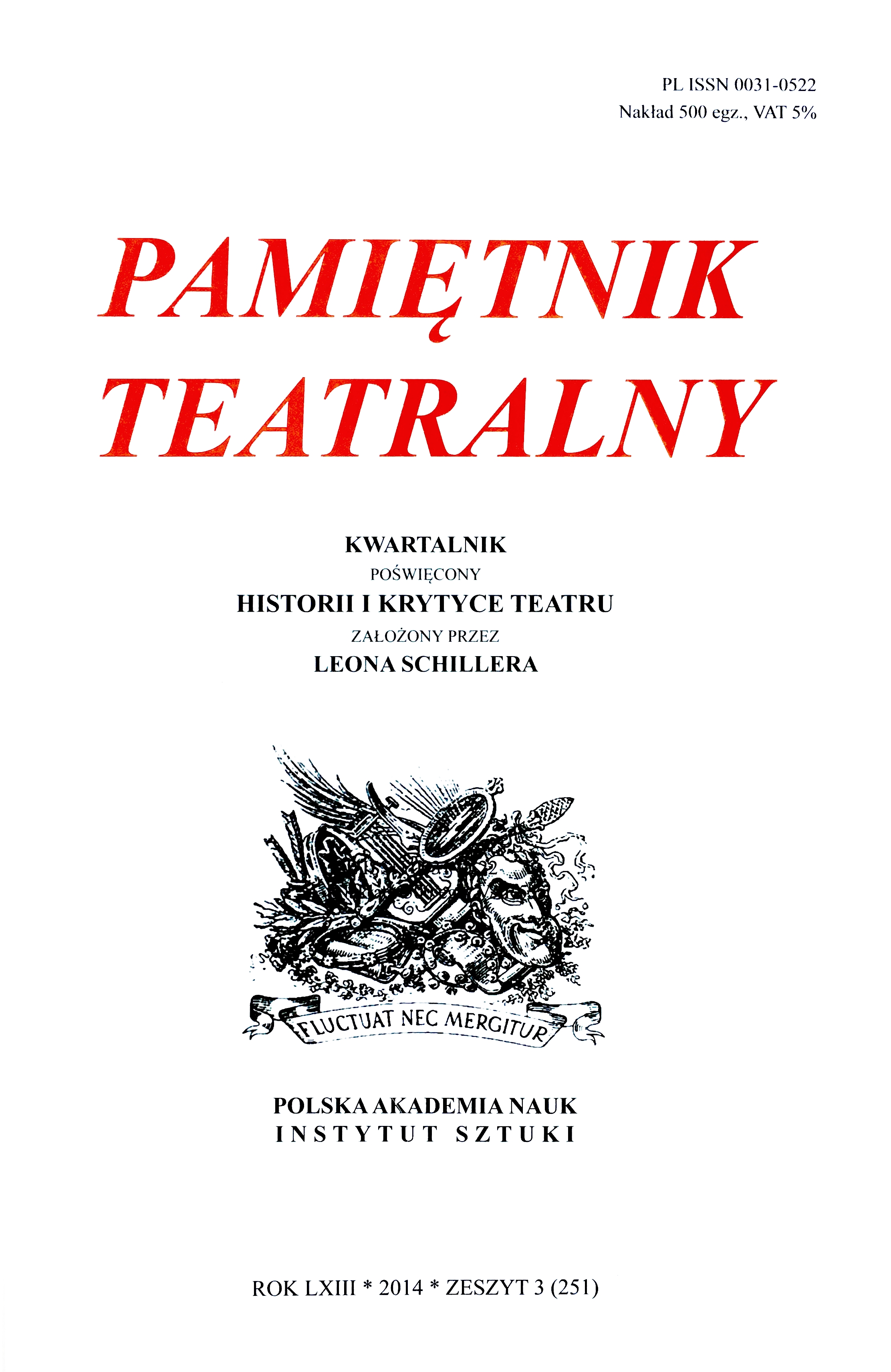Shakespeare – Swinarski – Hegel
Shakespeare – Swinarski – Hegel
Author(s): Jagoda Hernik SpalińskaSubject(s): Theatre, Dance, Performing Arts
Published by: Instytut Sztuki Polskiej Akademii Nauk
Keywords: Shakespeare;Swinarski Konrad;Hegel;
Summary/Abstract: Since his early years, Swinarski had been under the influence of Hegel’s philosophy, whose application he could see in Bertolt Brecht’s theatre. In one of his interviews he said: “Thus, through the contradiction between the ideal and reality, there comes to be a man who stands apart from this reality and is dissatisfied with it. This contradiction is what thought is born out of”. He admitted to ‘reading Romanticism “through Marx”, among others’. But Swinarski in the basic tenets of his thinking, concerning the issues of dialectic, objectification and the modern state, followed rather the Hegel that was often misconstrued and fell into oblivion because of the way his philosophy was interpreted by Marxism. The difference between the Marxian and Hegelian points of view becomes clear in Swinarski’s idea for staging Hamlet as it deals with Hegel’s social philosophy and his views on the state. Hegel warned that, due to prolonged peace, citizens engage in their private affairs so much that they forget what binds them to the state and he urged members of civil society to be ‘political animals’ as well. According to this Hegelian conception, Hamlet, educated in more developed European countries where had been taught to fear the violence of the state and the objectification it brought, and to endorse rationalism and shallow idealism, lost his primitive instinct to resolve conflict regardless of personal revulsion but with the interests of the whole in mind. The state requires that the individual subordinate himself and his body to its ends. In contrast, Marxism sees such objectification as a source of suffering, because Marx interpreted Hegel through the Feuerbachian reversed perspective ‘according to which the sphere of politics and law should be treated as an “alienated” manifestation, a mere appearance of the important social sphere, the one that is “truly human”’. Thus, in words of M. J. Siemek, young Marx and his later followers break away with ‘the Aristotelian idea of man as a zoon politikon: the intersubjective world of public life and actions ceases to exist as it becomes principally irrational. The social reality of human interactions turns into a confusing sphere of dark and dangerous forces, unintelligible and, for this reason, unyielding to any form of public control and regulation’. Hamlet was usually interpreted in such a Marxist fashion, as a hero objectified against his will, subjected to self-willed violence (of Claudius’ on the one hand, and Fortinbras’ on the other), estranged in the irrational world of politics. The same reification principle governed the totalitarian Communist regime that sought to separate the individual from politics that was viewed as impure and alienating. M. J. Siemek points out that ‘Communism radically severed the ontological link between polity and sociation. It deracinated politics from the basic structure of social life. As a result, the structures of authority and power became independent and self-legitimating to the point where political praxis lost any meaningful reference to both social reality and social theory’. Swinarski interpreted Shakespeare in a Hegelian, and not Marxian, way. Hamlet could have stopped the expansion of the new embodiment of evil only if he had properly understood his objectification by the state. The raison d’État required him not to fight his objectification but his modern education made him unable to accept it, castrating him politically and making him view politics as something impure and alien. Thus, in the name of distaste, which is the only thing he holds dear for the want of any other values, and ‘with an ironic sense of individual freedom, he starts out on his suicidal progress toward negation, which always ends with an encounter with nothingness’.
Journal: Pamiętnik Teatralny
- Issue Year: 251/2014
- Issue No: 3
- Page Range: 86-104
- Page Count: 19
- Language: Polish

